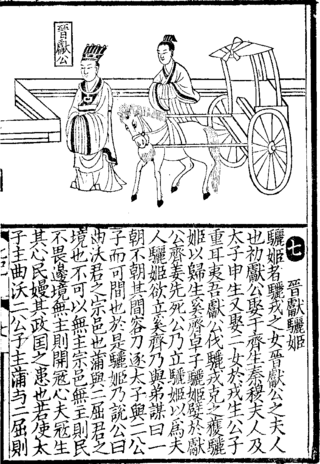
King Wu of Zhou, personal name Ji Fa, was the founding king of the Chinese Zhou dynasty. The chronology of his reign is disputed but is generally thought to have begun around 1046 BCE and ended with his death three years later.

King Cheng of Zhou, personal name Ji Song, was the second king of the Chinese Zhou dynasty. The dates of his reign are 1042–1021 BCE or 1042/35–1006 BCE. Ji Dan, Duke of Zhou served as regent during his minority. His parents were King Wu of Zhou and Queen Yi Jiang.

King Ping of Zhou, personal name Ji Yijiu, was the thirteenth king of China's Zhou dynasty and the first of the Eastern Zhou dynasty.

Jin, originally known as Tang (唐), was a major state during the middle part of the Zhou dynasty, based near the centre of what was then China, on the lands attributed to the legendary Xia dynasty: the southern part of modern Shanxi. Although it grew in power during the Spring and Autumn period, its aristocratic structure saw it break apart when the duke lost power to his nobles. In 403 BC, the Zhou court recognized Jin's three successor states: Han, Zhao, and Wei. The Partition of Jin marks the end of the Spring and Autumn period and the beginning of the Warring States period.

Sima Zhao, courtesy name Zishang (子上), was a Chinese military general, politician, and regent of the state of Cao Wei during the Three Kingdoms period of China.

Dan, Duke Wen of Zhou, commonly known as the Duke of Zhou, was a member of the royal family of the early Zhou dynasty who played a major role in consolidating the kingdom established by his elder brother King Wu. He was renowned for acting as a capable and loyal regent for his young nephew King Cheng, and for successfully suppressing the Rebellion of the Three Guards and establishing firm rule of the Zhou dynasty over eastern China. He is also a Chinese culture hero, with the authorship of the I Ching and the Classic of Poetry having traditionally been attributed to him, as well as the establishment of the Rites of Zhou.
Emperor Ai of Tang, also known as Emperor Zhaoxuan of Tang (唐昭宣帝), born Li Zuo, later known as Li Chu, was the last emperor of the Tang dynasty of China. He reigned—as a puppet ruler—from 904 to 907. Emperor Ai was the son of Emperor Zhaozong. He was murdered by Zhu Wen.

Jī was the ancestral name of the Zhou dynasty which ruled China between the 11th and 3rd centuries BC. Thirty-nine members of the family ruled China during this period while many others ruled as local lords, lords who eventually gained great autonomy during the Spring and Autumn and Warring States periods. Ji is a relatively uncommon surname in modern China, largely because its bearers often adopted the names of their states and fiefs as new surnames.

Romance of the Three Kingdoms is a Chinese television series adapted from the classical 14th century novel of the same title by Luo Guanzhong. The series was produced by China Central Television (CCTV) and was first aired on the network in 1994. It spanned a total of 84 episodes, each approximately 45 minutes long. One of the most expensive television series produced at the time, the project cost 170 million yuan. It was completed over four years and involved over 400,000 cast and crew members, including divisions of the People's Liberation Army from the Beijing, Nanjing and Chengdu military regions. Some of the dialogue spoken by characters was adapted directly from the novel. Extensive battle scenes, such as the battles of Guandu, Red Cliffs and Xiaoting, were also live-acted.

Duke Xian of Jin, ancestral name Ji (姬), given name Guizhu (詭諸), was the nineteenth ruler of the State of Jin. He was also the ninth ruler of Jin in the Spring and Autumn period and the second duke of Jin. When his father, Duke Wu of Jin, died in 677 BC, Guizhu ascended the throne of Jin and became Duke Xian of Jin. He reigned for 26 years. He moved the capital from Quwo (曲沃) to Jiang (絳). He was named after a Rongdi tribe (戎狄族) leader Guizhu (詭諸) whom his father, Duke Wu of Jin, captured alive.

Xiefu or Xie was the original Marquis of Jin, and the second ruler of the State of Jin during the early Zhou dynasty. His ancestral name was Ji (姬), and given name Xie (燮) or Xiefu (燮父).
Count Zhuang of Quwo, ancestral name Ji (姬), given name Shan (鱓), was the second ruler of the state of Quwo during the Spring and Autumn period. He was the son of Huan Shu of Quwo and half-brother of Wuzi of Han.
Duke Wu of Jin, ancestral name Ji (姬), given name Cheng (稱) and also known as Duke Wu of Quwo, was the eighteenth ruler of the state of Jin. He was also the last ruler of the state of Quwo before he gained the title as the duke of Jin.
Duke Xiang of Qi was from 697 to 686 BC the fourteenth recorded ruler of the State of Qi, a major power during the Spring and Autumn period of ancient China. His personal name was Lü Zhu'er (呂諸兒), ancestral name Jiang, and Duke Xiang was his posthumous title.
Eternity: A Chinese Ghost Story (倩女幽魂) is a Chinese period drama series produced by Taiwanese station CTS in collaboration with several other countries. It is loosely based on several famous folktales such as the love story of Nie Xiaoqian and Ning Caicheng from Pu Songling's novel Strange Stories from a Chinese Studio (聊斋志异), the legend of Gan Jiang and Mo Ye and others. The cast consists of actors from China, Hong Kong, Taiwan, Malaysia and Singapore.
Yang (State) was a state established during the Western Zhou dynasty and the Spring and Autumn period of ancient China.

The Legend of Mi Yue (Chinese: 羋月傳; pinyin: Mǐ Yuè Zhuàn; Wade–Giles: Mi3 Yüeh4 Chuan4) is a 2015 Chinese television series directed by Zheng Xiaolong and based on Jiang Shengnan's eponymous historical novel. It stars Sun Li in the title role of Mi Yue. The series aired 2 episodes daily on Beijing TV and Dragon TV from 30 November 2015 to 9 January 2016.

Chinese Paladin 5 is a 2016 Chinese television series adapted from the adventure role-playing game of the same name by Softstar Entertainment. The series is produced by Chinese Entertainment Shanghai and stars Elvis Han, Guli Nazha, Joe Cheng, Yang Caiqi, Gina Jin and Geng Le. It was first aired on Hunan TV from 23 May to 19 July 2016.
Yi Jiang, was a Chinese queen and government minister. She was married to King Wu of Zhou. She was the first queen of the Zhou dynasty. She, Fu Hao and Lady Nanzi belonged to the few politically influential women in China prior to Queen Dowager Xuan.












